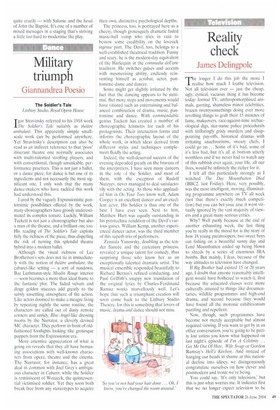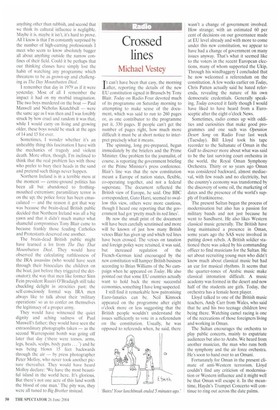Reality check
James Delingpole
The longer I do this job the more I realise how much I loathe television. Not all television ever — just the cheap, ugly, cynical, vacuous thing it has become today: format TV, anthropomorphised animals, gurning, shameless minor celebrities, brazen twentysomethings doing ever more revolting things to grab their 15 minutes of fame, makeovers, race-against-time archaeological digs, star-name police procedurals with titillatingly grisly murders and disappointing pay-offs, historical dramas with irritating anachronisms, sweaty chefs. I could go on .. Some of it's bad, some of it's less bad, but it's all at bottom utterly worthless and if we never had to watch any of this rubbish ever again, your life, all our lives, would be infinitely the richer for it,
I felt all this particularly strongly as I watched The Day Mountbatten Died (BBC2, last Friday). Here, very possibly, was the most intelligent, moving, illuminating programme anywhere on TV all week (not that there's exactly much competition) but you can bet your arse it went virtually ignored by the vast majority of viewers and a great many serious critics.
Why? Well partly because at the end of another exhausting week, the last thing you're really in the mood for is the story of how 18 young paratroopers, two sweet boys out fishing on a beautiful sunny day and Lord Mountbatten ended up being blown to shreds by a series of enormous IRA bombs. But mainly, I fear, because of the way attitudes to television have changed.
If Big Brother had existed 15 or 20 years ago, I doubt that anyone reasonably intelligent would have bothered to watch it, first because the educated classes were more culturally attuned to things like documentaries, wildlife programmes and high-end drama, and second because they would have found all the moronic exhibitionism puzzling and repellent.
Now, though, such programmes have become not merely acceptable but almost required viewing. If you want to get by in an office conversation, you're going to be pretty lost unless you know what happened on last night's episode of I'm A Celebrity. Get Me Out Of Here, Wife Swap or Gordon Ramsay's Hell's Kitchen. And instead of hanging our heads in shame at this national decline into idiocy, we disingenuously congratulate ourselves on how clever and postmodern and ironic we're being.
You could say, It's only television,' but this is just what worries me. It indicates first that we no longer expect television to be anything other than rubbish, and second that we think its cultural influence is negligible. Maybe it is, maybe it isn't, it's hard to prove, All I know is that I'm constantly surprised by the number of high-earning professionals I meet who seem to know absolutely bugger all about anything outside the narrow confines of their field. Could it be perhaps that our thinking classes have simply lost the habit of watching any programme which threatens to be as grown-up and challenging as The Day Mountbatten Died.
I remember that day in 1979 as if it were yesterday. Most of all I remember the impact it had on my morbid imagination. The two boys murdered on the boat — Paul Maxwell and Nicholas Knatchbull — were the same age as I was then and I was forcibly struck by how cruel and random it was that, while I would carry on living and growing older, these boys would be stuck at the ages of 14 and 15 for ever.
Sometimes, I wonder whether it's an unhealthy thing this fascination I have with the mechanics of tragedy and violent death. More often, though, I'm inclined to think that the real problem lies with those who prefer to bury their heads in the sand and pretend such things never happen.
Northern Ireland is in a terrible mess at the moment — centre-ground politics has been all but abandoned to frothingmouthed extremism; paramilitary terror is on the up; the police force has been emasculated — and the reason it got that way was because the brain-dead British public decided that Northern Ireland was all a big yawn and that it didn't much matter what shameful compromises Tony Blair came to because frankly those feuding Catholics and Protestants deserved one another.
The brain-dead British public might have learned a lot from The Day That Mountbatten Died. They would have observed the calculating ruthlessness of the IRA assassins (who would have seen through their binoculars the children on the boat, just before they triggered the detonator); the way that men like former Sinn Fein president Ruairi O'Bradaigh still take chuckling delight in atrocities past; the self-consciously formal way IRA men always like to talk about their 'military operations' so as to confer on themselves the legitimacy of a proper army.
They would have witnessed the quiet dignity and aching sadness of Paul Maxwell's father; they would have seen the extraordinary photographs taken — as the second Warrenpoint bomb was going off later that day (there were torsos, arms, legs, heads, scalps, body parts ... ') and he was being blown 15 feet backwards through the air — by press photographer Peter Molloy, who never took another picture thereafter. They would have heard Molloy declare: 'We have the most beautiful island in the world here. It's glorious. But there's not one acre of this land worth the blood of one man.' The pity was, they were all tuned to Big Brother instead.



































































 Previous page
Previous page